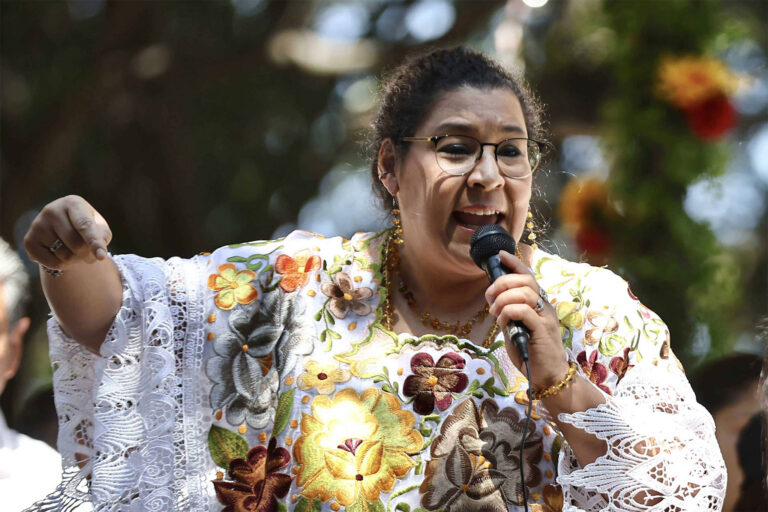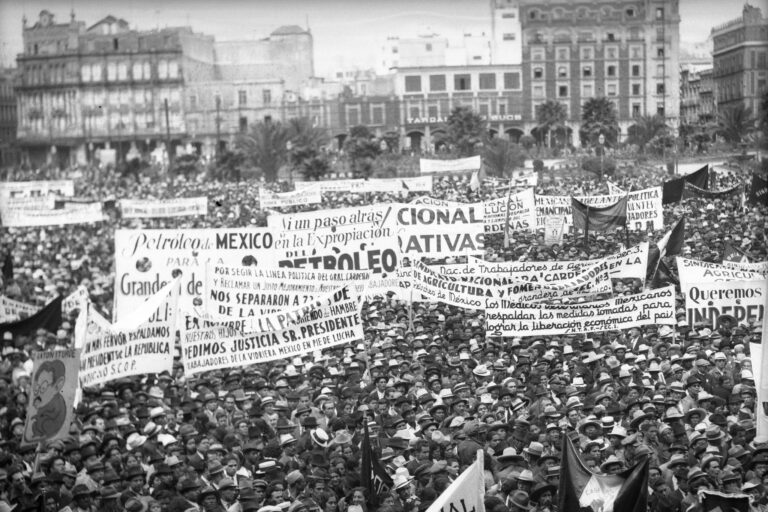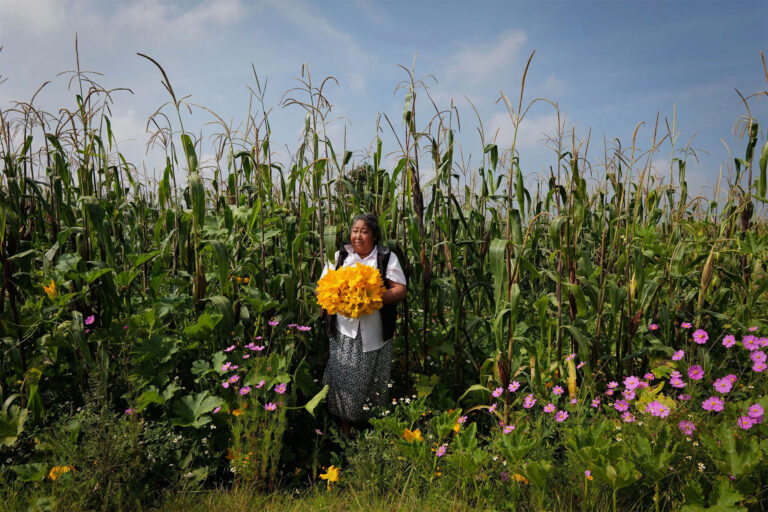Supreme Court Will No Longer be Held Hostage
This interview with Hugo Aguilar Ortiz, future chief justice of the Supreme Court of Justice of Mexico, by Ivan Evair Saldaña, appeared in the July 7, 2025 edition of La Jornada, Mexico’s premier leftist daily newspaper.

In a few weeks, he will take on the greatest contemporary challenge in the history of the national justice system: leading the restructuring of a Federal Judicial Branch (PJF) accused of being tainted by corruption. Hugo Aguilar Ortiz, the future chief justice of the Supreme Court of Justice of the Nation (SCJN), predicts that the Court will no longer be held hostage to external and internal interests and will instead deliver justice for all, especially for those at the bottom.
He takes up that challenge, denouncing attempts to corrupt him during the recent campaign. “There were groups that told me: ‘Here are my votes, and you commit to failing this way or that way.'”
“Which sectors? Political, private?” he was asked.
“More than anything, it’s about economic interests. I told them: you’re going to have a dialoguing Court, and we’re going to discuss your issues. Yes, but a commitment?, they told me. I responded: ‘No, that’s what we’re trying to vaccinate the Court with.’ They said: ‘No, then you won’t be on our list (of candidates).'”
“I told them: ‘Tell your people that my offer is one of dialogue and objectivity. If they don’t want to vote for us like that, then you are part of those who want the Court to be held hostage to interests,'” he concluded.
From a sober office in the Miguel Hidalgo mayor’s office, decorated with images of Indigenous women and phrases about equality, Aguilar Ortiz spoke with La Jornada and explained that the work plan is almost ready to be implemented starting September 1.
The new justices, he asserts, will transform the Supreme Court both formally and substantively to make it more accessible, transparent, and effective. This means ending backroom rulings, stalling cases for years, and prioritizing cases of historical human rights abuses with rulings that help heal social wounds and thus calm protests and demonstrations.
“The Court has to give the impression that it’s actually meeting this need for justice; that’s the challenge. From the top down, but primarily from those at the bottom. Those at the top have law firms and they’re going to come (to the Court), and there I have to figure out how to serve them. But for those at the bottom, if I don’t do something, they won’t get there,” he explained.
He also addressed the relationship the Federal Judiciary (PJF) will maintain with the executive and legislative branches after the estrangement that began in January 2023, when Minister Norma Piña Hernández assumed the presidency. Aguilar Ortiz is committed to dialogue without subordination or compromise.
“I hope they (the powers) are also open to dialogue. For example, if there’s a proposed amparo bill, why not listen to the Court? I don’t think it’s fair. I’m going to wait for the amparo bill to be passed and then throw it out? Well, what’s the need? We’re not going to play arm-twisting, arm-twisting, either,” he maintains.

I only owe those who voted for me.
He categorically rejected the idea that the nearly 6.2 million votes he received imply any commitment to political parties, governments, or business groups. “I [campaigned with] my savings and I have no debts to anyone, except those who voted for me.”
Regarding the accordions used to vote, many of which were linked to Morena, the jurist dismisses the possibility that his victory was determined by the wide margin he obtained. However, he admits that any voter would require a guide, as it took him 40 minutes to make his own.
“The list was necessary. It was unfeasible to hold an election without support
,” he declared.
He acknowledges that powerful groups persist within the PJF, as only half of its members were renewed. He points out that during the campaign they faced this reality, hearing complaints about corruption, slow trials, and improper charges.
Therefore, he warns that “if there is no oversight and no sanctions, in five years we will have the same vices: corruption, dishonesty, and the sale of justice. The Disciplinary Tribunal will be crucial.”
He emphasizes that his track record defending Indigenous and Afro-Mexican peoples doesn’t compromise his impartiality, but rather represents an opportunity to bring justice closer with “minimal adjustments (to the law) and attitude (of the judge). In Indigenous communities, you serve a year without pay and you earn respect. That should be a value.”
He took the opportunity to defend his tenure as INPI’s general coordinator of Indigenous rights until last May, following questions alleging that he limited participation in the Yaqui Justice Plan consultations. “The Yaqui people’s deliberations take place in their traditional guardhouse, where I have no influence. And it’s an open space… The institute didn’t set up barriers, filters, or guards to select people.”
Currently, the outgoing Court’s plenary session is divided, making it difficult to achieve a qualified majority to validate or invalidate laws. However, it states that it does not expect unanimity, although the affinity of the future integration with the so-called 4T has been noted.
“Constitutional interpretation is rarely unanimous. But there can be unity of method, approach, and objectives: to serve,” he maintains.
Aguilar Ortiz will be the first president of the Court elected by popular vote—since Benito Juárez in the 19th century—although with less power than his predecessors following the September 15, 2024, reform that removes his administrative and disciplinary control from the PJF.
However, he doesn’t see this as a disadvantage, as long as there is coordination with the new Disciplinary Tribunal and the Judicial Administration Body. He even sees it as a positive, as with fewer functions, he will request a working group to resolve cases, something that, he asserts, Norma Piña and previous leaders have not done: “I will also request, even as president, that I apply my opinion to each case.”
Regarding the backlog of thousands of cases and the disappearance of the two chambers, he announced that in August he will present a plan to his colleagues to address them. He reserves the right to comment on specific cases, such as the Grupo Salinas tax disputes, so as not to be declared disqualified. “I’m not going to make that mistake… I suppose they’re planning a scenario in which all the ministers are disqualified, so there’s no one left to resolve the case,” he warns.
But he guarantees that there will be an end to backroom rulings and backlogged files. Furthermore, they will review procedural deadlines and seek to reduce them, while criticizing the fact that currently, the publication of rulings can take up to two years and the processing of a file can take up to 15 days. He adds: ” I will request that files be processed within 48 hours.”
Regarding the need to adjust the Court’s powers to address only strictly constitutional matters, he clarified that there are mandatory issues because criteria such as the environment, women, and Indigenous peoples have not been consolidated.
“In some areas, we’re starting from scratch. [Issues around] Indigenous peoples, for example, were reformed on September 30. For me, all cases involving indigenous peoples should be included,” he notes.
Regarding ministerial privileges, such as health insurance, cards worth 60,000 pesos, or armored vehicles, he asserts that only the strictly necessary will be maintained. Six cell phones per minister? No. Armored vehicles? “Only if they’re essential. He points out that he wouldn’t put anyone at risk.”
Regarding the Indigenous agenda, he affirms that the Court should help implement Article 2 of the Constitution: “What is occupation? What places are sacred? How is cultural heritage protected? All of this requires criteria. I’m not going to impose them. We’re going to build them through dialogue and expert opinion.”
-
Genocidal & Extractive Capitalism
This week, the United States claimed to be negotiating to avoid war with Iran. It was merely a cover for a new attack. Where are the efforts to stop it?, asks Mexican Supreme Court Minister Lenia Batres.
-
Trump Will Not Take Our Oil
Venezuela’s oil belongs to the Bolivarian Republic. Mexican oil belongs to the people of Mexico. If the current administration decides to trade it with Cuba or any other country, it has every right to do so. Mexican oil does not belong to the US nor to Donald Trump.
-
Not By Bread Alone…
Returning to the Mesoamerican milpa agricutlural system could revitalize agriculture, while defending Mexicans and Mexico from a tangled, global necro-politics.




